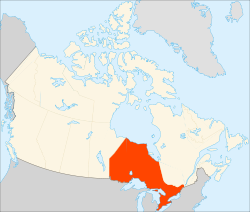Portal:Ontario
The Ontario Portal


Ontario (/ɒnˈtɛərioʊ/ on-TAIR-ee-oh; French: [ɔ̃taʁjo]) is the southernmost province of Canada. Located in Central Canada, Ontario is the country's most populous province. As of the 2021 Canadian census, it is home to 38.5 percent of the country's population, and is the second-largest province by total area (after Quebec). Ontario is Canada's fourth-largest jurisdiction in total area of all the Canadian provinces and territories. It is home to the nation's capital, Ottawa, and its most populous city, Toronto, which is Ontario's provincial capital.
Ontario is bordered by the province of Manitoba to the west, Hudson Bay and James Bay to the north, and Quebec to the east and northeast. To the south, it is bordered by the U.S. states of (from west to east) Minnesota, Michigan, Ohio, Pennsylvania, and New York. Almost all of Ontario's 2,700 km (1,700 mi) border with the United States follows rivers and lakes: from the westerly Lake of the Woods, eastward along the major rivers and lakes of the Great Lakes/Saint Lawrence River drainage system. There is only about 1 km (5⁄8 mi) of actual land border, made up of portages including Height of Land Portage on the Minnesota border.
The great majority of Ontario's population and arable land is in Southern Ontario, and while agriculture remains a significant industry, the region's economy depends highly on manufacturing. In contrast, Northern Ontario is sparsely populated with cold winters and heavy forestation, with mining and forestry making up the region's major industries. (Full article...)
Selected article -

General images
Surrounding areas
Selected biography -
Francis Clarence McGee (November 4, 1882 – September 16, 1916) was a Canadian ice hockey player for the Ottawa Hockey Club (also known as the Silver Seven) between 1903 and 1906. He played as a centre and as a rover. He was also a civil servant for the government of Canada and later became a lieutenant in the Canadian Army.
McGee was known as "One-Eyed" Frank McGee because he was blind in one eye due to a hockey injury. After missing two years of play because of the injury, he joined the senior Ottawa team in 1903. A well-known player of his era for his prolific scoring, McGee once scored 14 goals in a Stanley Cup game and scored five goals or more in a game on eight other occasions. Despite a brief senior career—only 45 games over four seasons—he helped Ottawa win and retain the Stanley Cup title from 1903 to 1906. (Full article...)Selected image
Did you know? -
- ... that Doug McMurdy was the inaugural winner of the Red Tilson Trophy, given to the most outstanding player in the Ontario Hockey League each season?
Related projects and portals
Topics
Categories
Things you can do
- Help expand stub articles: There are numerous stub articles relating to Ontario. You can help by expanding them. See Ontario stubs for a list. Also, for geographical (places) stubs, refer to:
- Eastern Ontario: Eastern Ontario geography stubs
- Toronto: Toronto geography stubs
- Ottawa: Ottawa stubs - All stubs relating to Ottawa in general
- Northern Ontario: Northern Ontario geography stubs
- Western Ontario: Western Ontario geography stubs
- Golden Horseshoe: Golden Horseshoe geography stubs
Associated Wikimedia -
The following Wikimedia Foundation sister projects provide more on this subject:
-
Commons
Free media repository -
Wikibooks
Free textbooks and manuals -
Wikidata
Free knowledge base -
Wikinews
Free-content news -
Wikiquote
Collection of quotations -
Wikisource
Free-content library -
Wikiversity
Free learning tools -
Wikivoyage
Free travel guide -
Wiktionary
Dictionary and thesaurus








































